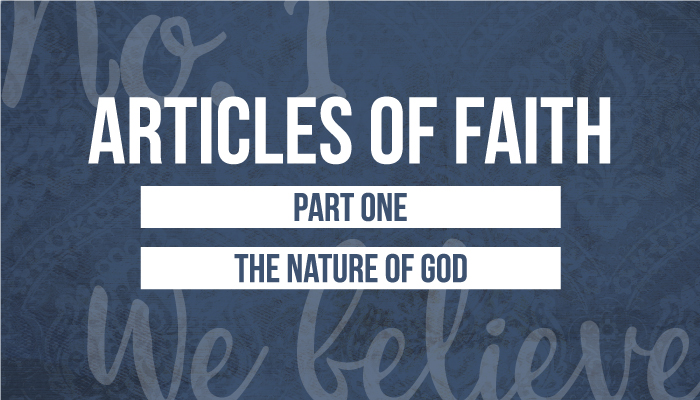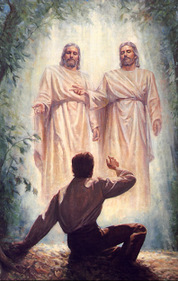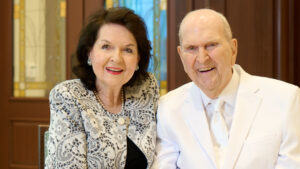
Articles of Faith Part One: The Nature of God
This piece is the first in a series on the thirteen Articles of Faith. In the early days of The Church a newspaper editor named John Wentworth wrote to the Prophet Joseph Smith asking about Mormon beliefs. Joseph responded with a list of thirteen fundamental doctrines which we call The Articles of Faith. During this series we will explore each Article of Faith as well as its significance and application in the lives of church members.
Article of Faith 1: “We believe in God, the Eternal Father, and in His Son, Jesus Christ, and in the Holy Ghost.”
The First and Great Commandment
In explaining LDS beliefs Joseph Smith listed our belief in God first and foremost. Christ tells us that to love God is the “first and great commandment,” so, naturally, belief in God is also the first and most fundamental principle in our faith.
Our belief in the nature of God sets us apart from mainstream Christianity. The concept of Trinity—God the father, God the Son and the Holy Spirit all as one unknowable entity called God—has no place in LDS doctrine. Instead, as this Article of Faith implies, we understand The Godhead as three separate divine beings—God the Father, the literal father of our eternal spirits, in whose image we were created, His Only Begotten Son in the flesh, Jesus Christ, who gave His life for our eternal salvation, and the Holy Spirit, their earthy emissary of divine truth.
God—has no place in LDS doctrine. Instead, as this Article of Faith implies, we understand The Godhead as three separate divine beings—God the Father, the literal father of our eternal spirits, in whose image we were created, His Only Begotten Son in the flesh, Jesus Christ, who gave His life for our eternal salvation, and the Holy Spirit, their earthy emissary of divine truth.
We Can Know God
Rather than being formless and incomprehensible, we believe that God has a perfected physical body and we can grow to know Him personally. In a 2003 conference address entitled “The Grandeur of God,” Elder Jeffery R. Holland explains, “all of us need to know God more fully in order to love Him more deeply and obey Him more completely.”
Elder Holland concludes that talk with a powerful testimony which sums up much of our understanding of God.
“I bear personal witness this day of a personal, living God, who knows our names, hears and answers prayers, and cherishes us eternally as children of His spirit. I testify that amidst the wondrously complex tasks inherent in the universe, He seeks our individual happiness and safety above all other godly concerns. We are created in His very image and likeness, and Jesus of Nazareth, His Only Begotten Son in the flesh, came to earth as the perfect mortal manifestation of His grandeur. In addition to the witness of the ancients we also have the modern miracle of Palmyra, the appearance of God the Father and His Beloved Son, the Savior of the world, to the boy prophet Joseph Smith. I testify of that appearance, and in the words of that prophet I, too, declare:
“Our heavenly Father is more liberal in His views, and boundless in His mercies and blessings, than we are ready to believe or receive. … God does not look on sin with [the least degree of] allowance, but … the nearer we get to our heavenly Father, the more we are disposed to look with compassion on perishing souls; we feel that we want to take them upon our shoulders, and cast their sins behind our backs.”
I bear witness of a God who has such shoulders. And in the spirit of the holy apostleship, I say as did one who held this office anciently: “Herein [then] is love, not that we loved God, but that he loved us, and sent his Son to be the propitiation for our sins. Beloved, if God so loved us, we ought also to love one another”—and to love Him forever, I pray. In the sacred name of Jesus Christ, amen.”
The Take-Away
How blessed we are as Latter-day Saints to know that we can grow closer to our Father in Heaven. The first Article of Faith adds to our understanding of the vital importance of our belief in God, because knowing the nature of God is key in developing a testimony of God and a personal relationship with Him.
How do you develop your relationship with God? Tell us your tips in the comments.









